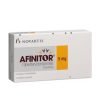- FREE SHIPPING! on orders over $95*
No products in the cart.
Return To Shop
Adempas
$855.00
Adempas (riociguat) is a soluble guanylate cyclase stimulator prescribed to treat high blood pressure in the lungs, pulmonary arterial hypertension (PAH) and chronic thromboembolic pulmonary hypertension (CTEPH) in adults. This medication works by stimulating the nitric oxide-soluble guanylate cyclase pathway to relax and widen pulmonary blood vessels, reducing pressure in the lungs and improving exercise capacity. For patients seeking affordable specialized medications, working with qualified healthcare providers ensures proper diagnosis, appropriate monitoring, and access to authentic treatments with proper safety oversight for managing these rare but serious pulmonary vascular conditions effectively.
- Prescription Required
- Please note all prices are in US dollars
Adempas (Riociguat) – Complete Product Information
Adempas (riociguat) represents a groundbreaking advancement in the treatment of pulmonary hypertension as the first and only soluble guanylate cyclase (sGC) stimulator approved for clinical use. This innovative medication works through a novel mechanism by directly stimulating the nitric oxide receptor sGC, which plays a crucial role in vasodilation and regulation of pulmonary vascular tone.
Riociguat’s unique mechanism of action involves both direct stimulation of sGC and sensitization of the enzyme to endogenous nitric oxide. This dual effect results in increased production of cyclic guanosine monophosphate (cGMP), leading to smooth muscle relaxation, vasodilation, and reduced pulmonary vascular resistance. Unlike other pulmonary hypertension treatments that work through different pathways, Adempas targets the fundamental nitric oxide-sGC-cGMP signaling cascade.
The medication is available in multiple tablet strengths (0.5mg, 1mg, 1.5mg, 2mg, and 2.5mg) allowing for precise dose titration based on individual patient response and tolerability. Treatment begins with a low dose of 1mg three times daily, with careful upward titration every two weeks based on systolic blood pressure and tolerability, up to a maximum of 2.5mg three times daily.
Clinical Effectiveness and Unique Benefits: Clinical trials demonstrate that Adempas significantly improves exercise capacity as measured by the six-minute walk distance, with patients experiencing increases of 30-46 meters compared to placebo. The medication also improves pulmonary vascular resistance, cardiac output, and quality of life measures in both PAH and CTEPH patients.
For patients with cardiovascular conditions, Adempas offers unique advantages as it addresses the underlying pathophysiology of pulmonary hypertension rather than just providing symptomatic relief. The medication is particularly valuable for CTEPH patients who are not surgical candidates or have persistent pulmonary hypertension after pulmonary endarterectomy.
Specialized Patient Population: Adempas treats rare but serious conditions affecting approximately 15-50 people per million population. Pulmonary arterial hypertension involves progressive narrowing and stiffening of small pulmonary arteries, while chronic thromboembolic pulmonary hypertension results from organized blood clots obstructing pulmonary vessels. Both conditions lead to elevated pulmonary pressures, right heart strain, and progressive exercise limitation.
Important Safety Considerations: Adempas has significant drug interactions, particularly with phosphodiesterase-5 inhibitors (sildenafil, tadalafil, vardenafil) and nitrates, which can cause dangerous hypotension. The medication requires careful blood pressure monitoring and dose adjustments, especially during initiation and titration phases. Patients must be counseled about the teratogenic risks, with mandatory pregnancy testing and contraception for women of childbearing potential.
Recent safety updates emphasize the importance of proper dose titration and monitoring for hypotension, particularly in patients receiving multiple cardiovascular medications. The medication should be used only by healthcare providers experienced in managing pulmonary hypertension, as proper diagnosis, treatment selection, and monitoring require specialized expertise.
For patients managing complex pulmonary vascular diseases, coordination with pulmonologists or cardiologists specializing in pulmonary hypertension is essential. Those taking other cardiovascular medications need careful assessment for drug interactions and hypotension risk. Patients exploring affordable specialized treatment options should work with qualified healthcare providers to ensure proper diagnosis, treatment selection, and ongoing monitoring for both therapeutic effectiveness and potential complications, as pulmonary hypertension medications require highly specialized medical expertise and should never be managed without appropriate pulmonary vascular disease specialists and comprehensive monitoring protocols.
| Brand | Adempas Brand |
|---|---|
| Form | 0.5mg 42 Tablets, 1.5mg 42 Tablets, 1mg 42 Tablets, 2.5mg 42 Tablets, 2mg 42 Tablets |
Adempas can cause various side effects related to its vasodilating properties and effects on the cardiovascular system. Most side effects are dose-related and may improve with proper dose adjustment.
Very Common Side Effects (≥10% of patients):
- Headache: Most frequently reported side effect, often dose-related
- Dizziness: Related to vasodilation and blood pressure effects
- Dyspepsia: Indigestion, stomach upset, heartburn
- Peripheral edema: Swelling in legs, ankles, and feet
- Nausea: Stomach discomfort, often during dose initiation
Common Side Effects (1-10% of patients):
- Hypotension: Low blood pressure, particularly systolic
- Vomiting: Often accompanies nausea
- Diarrhea: Loose stools or increased bowel movements
- Gastritis: Stomach inflammation
- Gastroesophageal reflux: Heartburn and acid reflux
- Constipation: Reduced bowel movement frequency
- Palpitations: Awareness of heartbeat
- Anemia: Reduced red blood cell count
- Nasal congestion: Stuffy nose
- Epistaxis: Nosebleeds
Cardiovascular Side Effects:
- Symptomatic hypotension: Low blood pressure with symptoms
- Syncope: Fainting episodes
- Tachycardia: Increased heart rate
- Chest pain: Non-cardiac chest discomfort
- Heart palpitations: Irregular or rapid heartbeat sensation
- Fluid retention: Worsening edema
Serious Side Effects Requiring Immediate Attention:
- Severe hypotension: Systolic BP <95 mmHg with symptoms
- Pulmonary edema: Fluid accumulation in lungs
- Signs of right heart failure: Worsening edema, fatigue, shortness of breath
- Hemoptysis: Coughing up blood
- Severe allergic reactions: Rash, difficulty breathing, swelling
Gastrointestinal Side Effects:
- Abdominal pain: Stomach cramping and discomfort
- Bloating: Abdominal distension
- Dysphagia: Difficulty swallowing
- Abdominal distension: Feeling of fullness
- Gastrointestinal hemorrhage: Bleeding in digestive tract (rare)
Respiratory Side Effects:
- Cough: Persistent or worsening cough
- Dyspnea: Shortness of breath
- Hemoptysis: Blood in sputum
- Pulmonary hemorrhage: Bleeding in lungs (rare but serious)
- Rhinitis: Nasal inflammation
Neurological Side Effects:
- Vertigo: Spinning sensation
- Tremor: Involuntary shaking
- Cognitive impairment: Difficulty concentrating
- Insomnia: Sleep disturbances
- Anxiety: Nervousness and restlessness
Hematological Side Effects:
- Iron deficiency anemia: Low iron levels and reduced hemoglobin
- Decreased hemoglobin: Reduction in red blood cell levels
- Thrombocytopenia: Low platelet count (rare)
- Bleeding tendency: Increased risk of bleeding
Drug Interaction Side Effects:
- PDE-5 inhibitors: Severe hypotension (contraindicated)
- Nitrates: Dangerous blood pressure drops (contraindicated)
- Antacids: Reduced riociguat absorption
- Smoking cessation: Increased riociguat levels
- Strong CYP inhibitors: Enhanced drug effects
Dose-Related Side Effects:
- During titration: Higher incidence of hypotension and dizziness
- Higher doses: Increased frequency and severity of side effects
- Rapid dose increases: Greater risk of symptomatic hypotension
- Individual variation: Some patients more sensitive to dose changes
Special Population Considerations:
- Elderly patients: Higher risk of hypotension and falls
- Liver disease: Increased drug levels and side effects
- Kidney disease: Altered drug clearance and effects
- Women of childbearing age: Teratogenic risks requiring contraception
- Smokers: Different metabolism affecting drug levels
Monitoring Requirements:
- Blood pressure: Regular monitoring, especially during titration
- Heart rate: Assessment for tachycardia or palpitations
- Exercise capacity: Six-minute walk distance testing
- Right heart function: Echocardiography monitoring
- Complete blood count: Monitor for anemia
- Liver function: Periodic assessment
- Pregnancy testing: Regular testing for women of childbearing potential
Emergency Situations:
- Symptomatic hypotension: Immediate medical evaluation
- Hemoptysis: Urgent assessment for pulmonary hemorrhage
- Syncope: Evaluate for severe hypotension or arrhythmias
- Signs of right heart failure: Worsening symptoms requiring hospitalization
- Pregnancy: Immediate discontinuation and medical consultation
Critical Safety Warning: Adempas is contraindicated with PDE-5 inhibitors (sildenafil, tadalafil, vardenafil) and nitrates due to the risk of life-threatening hypotension. Women of reproductive potential must use effective contraception and undergo regular pregnancy testing due to teratogenic risks.
Emergency Warning Signs: Seek immediate medical attention for severe dizziness or fainting, coughing up blood, severe shortness of breath, chest pain, or signs of worsening heart failure such as increased swelling or inability to lie flat.
Adempas (riociguat) has specific FDA-approved indications for rare but serious forms of pulmonary hypertension, based on comprehensive clinical trials demonstrating significant therapeutic benefits:
Primary Indications:
Pulmonary Arterial Hypertension (PAH) - WHO Group 1:
- Idiopathic PAH: Primary pulmonary hypertension of unknown cause
- Heritable PAH: Genetic forms including BMPR2, ALK1, and other mutations
- Drug and toxin-induced PAH: Including anorexigen-associated disease
- PAH associated with connective tissue disease: Scleroderma, lupus, mixed connective tissue disease
- PAH associated with congenital heart disease: Simple systemic-to-pulmonary shunts
- Functional class: WHO functional class II-III symptoms
Chronic Thromboembolic Pulmonary Hypertension (CTEPH) - WHO Group 4:
- Inoperable CTEPH: Patients unsuitable for pulmonary endarterectomy surgery
- Persistent/recurrent CTEPH: Continued pulmonary hypertension after pulmonary endarterectomy
- High surgical risk: Patients with prohibitive operative risk
- Functional improvement: To improve exercise capacity and WHO functional class
- Hemodynamic benefits: Reduction in pulmonary vascular resistance
Clinical Study Evidence:
PAH Clinical Trials (PATENT-1):
- Six-minute walk distance: 30-meter improvement vs placebo at 12 weeks
- Pulmonary vascular resistance: 223 dyn·s·cm⁻⁵ reduction vs placebo
- WHO functional class: Improvement in 21% vs 13% placebo
- Time to clinical worsening: Significant delay in disease progression
- Quality of life: Improved scores on disease-specific questionnaires
CTEPH Clinical Trials (CHEST-1):
- Six-minute walk distance: 46-meter improvement vs placebo at 16 weeks
- Pulmonary vascular resistance: 246 dyn·s·cm⁻⁵ reduction vs placebo
- WHO functional class: 33% improvement vs 15% placebo
- NT-proBNP levels: Significant reduction indicating improved heart function
- Long-term benefits: Sustained improvements in extension studies
Dosing and Administration:
Initial Dosing Protocol:
- Starting dose: 1mg three times daily (approximately 6-8 hours apart)
- Food requirements: Can be taken with or without food
- Baseline assessment: Systolic blood pressure must be ≥95 mmHg
- Titration interval: Increase by 0.5mg three times daily every 2 weeks
- Blood pressure monitoring: Check before each dose increase
Dose Titration Guidelines:
- Target dose: Up to 2.5mg three times daily (maximum dose)
- Titration criteria: Systolic BP ≥95 mmHg and no signs/symptoms of hypotension
- Dose reduction: Decrease by 0.5mg if systolic BP <95 mmHg
- Individual optimization: Some patients may benefit from doses <2.5mg
- Elderly patients: More conservative titration may be appropriate
Special Population Dosing:
- Hepatic impairment: Start with 0.5mg three times daily
- Renal impairment: No specific dose adjustment, but monitor closely
- Elderly patients: Consider starting with lower doses
- Smoking cessation: May require dose reduction due to increased levels
Patient Selection Criteria:
Ideal PAH Candidates:
- Confirmed diagnosis: Right heart catheterization showing mPAP ≥20 mmHg
- WHO Group 1: Precapillary pulmonary hypertension
- Functional limitation: WHO functional class II-III symptoms
- Treatment-naive or combination therapy: First-line or add-on treatment
- Adequate blood pressure: Systolic BP ≥95 mmHg
CTEPH Patient Selection:
- Confirmed CTEPH diagnosis: Imaging showing chronic thromboembolic disease
- Inoperable disease: Not suitable for pulmonary endarterectomy
- Persistent PH post-surgery: Continued elevated pressures after PEA
- Functional impairment: Exercise limitation and WHO class II-IV symptoms
- Stable condition: No acute pulmonary embolism within 3 months
Contraindications and Precautions:
Absolute Contraindications:
- Concomitant use with PDE-5 inhibitors (sildenafil, tadalafil, vardenafil)
- Concomitant use with nitrates or nitric oxide donors
- Pregnancy (Pregnancy Category X)
- Pulmonary hypertension associated with idiopathic interstitial pneumonias
- Hypersensitivity to riociguat or any component
Relative Contraindications and Cautions:
- Hypotension: Systolic BP <95 mmHg
- Severe hepatic impairment: Child-Pugh Class C
- Severe renal impairment: CrCl <30 mL/min
- History of serious bleeding: Pulmonary hemorrhage or hemoptysis
- Volume depletion: Dehydration or hypovolemia
Monitoring and Safety Protocols:
Baseline Assessments:
- Right heart catheterization: Confirm diagnosis and assess hemodynamics
- Echocardiography: Evaluate right heart function
- Six-minute walk test: Baseline exercise capacity
- Blood pressure: Ensure systolic BP ≥95 mmHg
- Laboratory tests: Complete blood count, liver function, NT-proBNP
- Pregnancy test: For women of reproductive potential
Ongoing Monitoring:
- Blood pressure: Before each dose increase and regularly during maintenance
- Exercise capacity: Six-minute walk test every 3-6 months
- Right heart function: Echocardiography every 6-12 months
- Hemoglobin levels: Monitor for anemia development
- Liver function: Periodic assessment
- Pregnancy testing: Monthly for women of childbearing potential
Treatment Goals and Outcomes:
Primary Treatment Goals:
- Improved exercise capacity: Increased six-minute walk distance
- Better functional class: WHO functional class improvement
- Hemodynamic improvement: Reduced pulmonary vascular resistance
- Delayed disease progression: Time to clinical worsening
- Quality of life enhancement: Improved daily functioning
Long-term Outcomes:
- Sustained benefits: Maintained improvements over years
- Survival benefit: Potential mortality reduction
- Reduced hospitalizations: Fewer disease-related admissions
- Right heart protection: Preservation of cardiac function
Combination Therapy Considerations:
Compatible Combinations:
- Endothelin receptor antagonists: Bosentan, ambrisentan, macitentan
- Prostacyclin analogs: Epoprostenol, treprostinil, iloprost
- Diuretics: For fluid management in right heart failure
- Anticoagulation: Warfarin for CTEPH patients
Prohibited Combinations:
- PDE-5 inhibitors: Never combine due to hypotension risk
- Other sGC stimulators: No other drugs in this class available
- Nitrates: Risk of severe hypotension
Special Clinical Situations:
Perioperative Management:
- Pre-operative assessment: Cardiovascular risk evaluation
- Anesthesia considerations: Risk of hypotension
- Post-operative monitoring: Careful blood pressure management
- Drug interactions: Avoid perioperative nitrates
Emergency Situations:
- Acute right heart failure: May require temporary discontinuation
- Severe hypotension:
How does Adempas work differently from other pulmonary hypertension medications?
Adempas is unique as the only soluble guanylate cyclase stimulator that directly targets the nitric oxide pathway. While other medications like endothelin receptor antagonists or prostacyclin analogs work through different mechanisms, Adempas both stimulates sGC directly and makes it more sensitive to nitric oxide. This dual action provides more comprehensive vasodilation in pulmonary vessels.
Why do I need to take Adempas three times daily?
Adempas has a relatively short half-life of about 7 hours, so three-times-daily dosing maintains consistent drug levels throughout the day. This ensures continuous pulmonary vasodilation and optimal clinical benefits. Taking doses approximately 6-8 hours apart helps maintain steady therapeutic levels and prevents fluctuations in pulmonary pressure.
What should I do if my blood pressure drops too low?
If you experience symptoms of low blood pressure like dizziness, lightheadedness, or fainting, sit or lie down immediately and contact your healthcare provider. Your doctor may need to reduce your dose or temporarily stop the medication. Never adjust the dose yourself, as Adempas requires careful medical supervision due to its effects on blood pressure.
Why is pregnancy such a serious concern with Adempas?
Adempas can cause serious birth defects and must never be used during pregnancy. Women of childbearing age must use reliable contraception and have monthly pregnancy tests. If pregnancy occurs, the medication must be stopped immediately. The teratogenic effects are serious enough that a special pregnancy prevention program is required for all female patients.
Can I take Adempas with erectile dysfunction medications?
Absolutely not. Adempas is contraindicated with all PDE-5 inhibitors including sildenafil (Viagra), tadalafil (Cialis), and vardenafil (Levitra). The combination can cause life-threatening drops in blood pressure. Even if youve taken these medications safely before, the combination with Adempas is extremely dangerous and potentially fatal.
How long does it take to find the right dose of Adempas?
Dose titration typically takes 8-12 weeks, starting at 1mg three times daily and increasing by 0.5mg every two weeks based on your blood pressure response and tolerability. Some patients may reach their optimal dose sooner, while others may need the full titration period. The process cannot be rushed due to the risk of dangerous hypotension.
What should I do if I miss a dose?
Take the missed dose as soon as you remember, unless its almost time for your next dose. Never take two doses at once to catch up, as this can cause dangerous drops in blood pressure. If you frequently forget doses, consider setting reminders, as consistent dosing is crucial for maintaining therapeutic benefits.
Why do I need regular blood pressure monitoring?
Adempas can cause significant drops in blood pressure, especially during dose adjustments. Regular monitoring helps ensure your blood pressure stays within safe ranges while still providing therapeutic benefits. Your doctor needs to balance effective treatment with safety, which requires careful blood pressure tracking throughout treatment.
Can I drink alcohol while taking Adempas?
Alcohol should be consumed very cautiously, if at all, while taking Adempas. Both alcohol and Adempas can lower blood pressure, and the combination may cause dangerous hypotension, dizziness, or fainting. Discuss any alcohol use with your healthcare provider, as even small amounts may be problematic for some patients.
What happens if smoking affects my Adempas levels?
Smoking can significantly affect how your body processes Adempas. Smokers often need higher doses because smoking increases drug metabolism. If you quit smoking while taking Adempas, your drug levels may increase, potentially requiring dose reduction. Always inform your doctor about changes in smoking habits, as this may necessitate dose adjustments.
Why am I experiencing more nosebleeds since starting Adempas?
Nosebleeds are a known side effect of Adempas due to its vasodilating effects on blood vessels throughout the body, including nasal vessels. While usually not serious, frequent or severe nosebleeds should be reported to your healthcare provider. In rare cases, this could indicate more serious bleeding complications requiring medical evaluation.
How will I know if Adempas is working for me?
Improvement may be gradual and include increased exercise tolerance, less shortness of breath during daily activities, improved energy levels, and better quality of life. Your doctor will monitor your progress with tests like the six-minute walk test, echocardiograms, and symptom assessments. Some patients notice improvements within weeks, while others may take months to see full benefits.
Can I take antacids while on Adempas?
Antacids can reduce the absorption of Adempas, making it less effective. If you need antacids, take them at least 2 hours before or after your Adempas dose. However, discuss with your healthcare provider first, as they may recommend alternative approaches for managing stomach upset that wont interfere with your pulmonary hypertension treatment.
What should I do if I cough up blood while taking Adempas?
Coughing up blood (hemoptysis) is a serious side effect that requires immediate medical attention. While this can occur in pulmonary hypertension patients regardless of treatment, Adempas may increase bleeding risk. Contact your healthcare provider immediately or seek emergency care, as this could indicate serious complications requiring prompt evaluation and treatment.
The content on this page has been supplied to onlinepharmacynow.com by an independent third party contracted to provide information for our website. onlinepharmacynow.com relies on these third parties to create and maintain this information and cannot guarantee the accuracy or reliability of the information that has been provided to us.
The drug information provided here is only a summary and does not contain all the list of possible side effects and drug interactions regarding this medication. Be sure to contact your doctor or pharmacist if you have any specific question or concern. If you require any advice or information about the drugs on this page, a medical condition or treatment advice, you should always speak to a healthcare professional.
Please note that not all products, including any referenced in this page, are shipped by our affiliated Europe Pharmacy. We are affiliated with other dispensaries that ship product to our customers from the following jurisdictions: Canada, New Zealand, Turkey and United Kingdom. The items in your order maybe shipped from any of the above jurisdictions. The products are sourced from various countries as well as those listed above. Rest assured, we only affiliate with our authorized dispensaries that procure product through reliable sources.
Required
Send Your Prescription
Secure Payment
No Hidden Fees
Fast Shipping
Typically Under 7 days

 Ask an expert
Ask an expert


